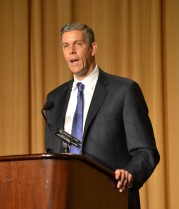InterACT: Corner Office Lessons in Leadership
From time to time I like to pick up useful advice intended for people in business, and apply it to education. One of my favorite sources is the New York Times feature “The Corner Office.” Adam Bryant interviews business leaders who share their insights and advice about management, and on September 26, the interviewee was Robin D. Richards, chief of the CareerArc Group. The title caught my eye: “Dissent Isn’t Just an Option. It’s Everyone’s Obligation.” What follows are some key quotes that are applicable both to teaching and to school system leadership.
What you learn as you develop as a manager is that balance of respect, approachability, empathy and friendship, so that you can say, “We’ve got a job to do and you have to do it, and it has to be done fast and properly.” I learned to be comfortable with those boundaries.

Secretary of Education Arne Duncan could use some leadership tips from The Corner Office (2011, photo by the author)
I think there’s useful advice here for the classroom and the administration – though I might want to tease out the meanings of “friendship” with students. Certainly we can be friendly, and work with each other in a spirit of friendship, but that doesn’t make us buddies or peers. Much has been written in recent years about the importance of empathy, and it seems to be in short supply among the leaders of some of the most distressed school systems in the country. Michelle Rhee, Joel Klein, and Rahm Emanuel come to mind. Or thePresident and Arne Duncan when they agreed with the firing of the entire teaching staff of a struggling school; Duncan also endorsed the printing of teachers’ “value-added” scores in the L.A. Times (before he changed his mind about that).
There are some simple rules to management that, if you apply them, will always work in any industry. The first one is respect. People have to know that they’re not there to serve you, and that they’re part of a team to accomplish a goal, and that you care as much about their career as you care about your own. You can’t just say it. You’ve got to do it.
You’ve got to constantly be asking them how they’re doing. You’ve got to let them have autonomy. You’ve got to let them run and do as much as they possibly can without fear. Then you’ve got to hold them accountable for that autonomy, and leave your office open so that anybody can feel free to come in and not be afraid.
If you listen to the education reformers who are most likely to bash teachers, you’ll hear that the problem with unions is that they advocate for teachers and not for students. Richards’ advice seems to suggest that enlightened management involves supporting the autonomy and the career aspirations of your reports. If so, are teachers out of line to advocate for better working conditions? I’m not suggesting a blanket endorsement of anything that any union might seek – but if we had more superintendents and school boards showing they care about teachers’ career satisfaction (“you can’t just say it”), then we might have less acrimony in negotiations.
Richards’ company also has a mantra that includes the “obligation to dissent” -
Don’t have a meeting with your boss where you agree with him on everything he says. If you have an obligation to dissent, then we get the best minds and we get the best outcomes. People like living in that environment. They feel valuable. People become fearless. For the most part, when you empower people, they really punch above their weight.
For teachers handed pacing guides and scripted curriculum, this concept could not be further from reality, both in terms of their relationships with each other and their leadership, and in their own classrooms. Such practices reduce teachers to the lowest level functionaries, and change classrooms from learning laboratories to industrial production lines.
We try to hire nice people, kind people. Kind people matter. One, it’s a nicer place to work, and two, I think people who are kind tend to play on teams much better. …I’m trying to find people who build close connections, because relationships are the reason businesses win.
I think Richards would probably do a good job of hiring teachers, too. But would school boards and politicians make it possible for him to cultivate those relationships? What are we doing to make it easier for teachers use kindness and teamwork to make a difference in schools? What are we doing to cultivate relationships in schools and communities when school staffing is slashed, schools are unnecessarily closed, and yet Teach for America reaps a windfall for bringing in outsiders with minimal training and low odds of sticking around?
So remember, those of you in education, when people tell you schools should be run more like a business, ask them if they mean run with a balance on teamwork and autonomy, staffed by kind people who are respected and supported by leaders who encourage dissent.
This blog post has been shared by permission from the author.
Readers wishing to comment on the content are encouraged to do so via the link to the original post.
Find the original post here:
The views expressed by the blogger are not necessarily those of NEPC.
